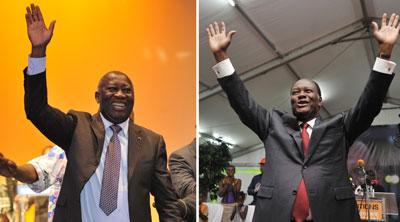New York, March 1, 2011–Supporters behind incumbent Ivorian president Laurent Gbagbo and rival Alassane Ouattara are targeting rival partisan media oulets and their journalists in an increasingly bloody struggle for power, the Committee to Protect Journalists said today.
On Monday, Marcel Legré, a printing press employee of La Refondation, publisher of the pro-Gbagbo daily Notre Voie, was killed by a mob in the the suburb of Koumassi in the economic capital Abidjan, according to local journalists. Legré’s affiliation with the newspaper was known in the area, Notre Voie reporter Guillaume Gbato told CPJ, adding that the Koumassi area is home to many Ouattara supporters.
The same day, nine pro-Ouattara newspapers indefinitely suspended publications citing “threats and harassment” from the Gbagbo administration and security forces, according to news reports.
Ivory Coast has been mired in a tense political and military standoff since disputed results of a contested November 2010 presidential runoff between Gbagbo and Ouattara, who remains holed up in an Abidjan hotel under the guard of U.N. peacekeepers as the internationally recognized president-elect. Heightening ethnic tensions and bloody skirmishes in Abidjan between forces loyal to Gbagbo and rebels backing Ouattara threaten to resume the civil war that split the country in a rebel-held north and a government-controlled south in 2002, according to news reports.
“It is becoming unbearably dangerous for media outlets and their journalists to operate in Ivory Coast as both Gbagbo and Ouattara camps exact reprisals on their critics in the press,” said CPJ Africa Advocacy Coordinator
The development followed Friday’s decision by the Gbagbo-controlled National Press Council, the official print media regulator, to suspend the pro-Ouattara daily Le Nouveau Réveil, for six editions over its February 22 edition, which contained allegations that forces loyal to Gbagbo had used rocket-propelled grenades against Ouattara supporters during a demonstration the day before. The council said graphic photos of killed protesters published by the newspaper to illustrate the article were “gruesome and shocking,” and amounted to “justifying violence and incitement to revolt,” according to CPJ research. Le Nouveau Réveil‘s Editor Denis Kaz Zion denied the allegations, he told CPJ.
Early Sunday, armed men destroyed a broadcast station housing a transmitter of the Gbagbo-controlled state Radiodiffusion Télévision Ivoirienne (RTI) in the Abobo district of Abidjan–a stronghold of Ouattara that has been the scene of deadly clashes, according to news reports. An unidentified technician was reported to be among the three fatalities in the attack, according to the local press freedom group Ivorian Committee for the Protection and Defense of Journalists (CIPJ). The transmitter’s destruction knocked RTI off the air for a few hours, according to the same sources.
The council also slapped fines of 1 to 2 million CFA francs (US$4,100) on pro-Ouattara dailies Le Patriote, Nord-Sud and Le Jour Plus for publishing the same photos. The media companies, Mayama Editions et Production (publishers of Le Patriote), Editions Le Néré (publisher of Le Jour Plus), and Nord Sud Communications were given 30 days to pay the fines.
CPJ remains concerned about the fates of jailed journalists Aboubacar Sanogo and Yayoro Charles Lopez Kangbé of rebel-controlled station TV Notre Patrie who spent 20 days in the custody of the military police without charge amid allegations of torture before being taken to court. They have not been formally charged but a magistrate in Abidjan denied their appeal for bail on Thursday, as they face accuations of undermining state security, according to the Ivorian Committee for the Protection and Defense of Journalists.
